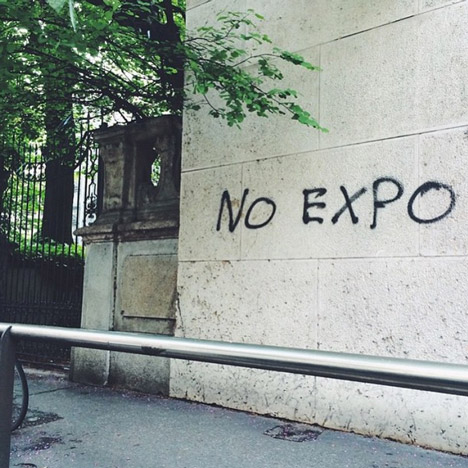Police have fired teargas at protesters opposing the Milan Expo on its opening day, who have set fire to cars and plastered the city in anti-Expo graffiti.
A report on newswire service Reuters described thick clouds of smoke rising from the streets, as a small number of protesters from a wider demonstration against the Expo responded to police blockades by setting fire to cars in central Milan.
Demonstrators threw stones and other objects at rows of riot police, who fired teargas. Windows were smashed and street furniture damaged. The clashes began just hours after the official opening ceremony for the Expo, which is one of the world's largest temporary architecture shows with over 140 pavilions commissioned by participating countries and companies.
"The elegant centre of Milan was transformed into a battleground, with sirens and periodic bangs from flash bombs and firecrackers ringing out against the shouts of protesters," said the Reuters report.
"The main part of the demonstration was halted by police vans blockading the street, but breakaway groups of demonstrators fought running battles in the rain that left streets littered with makeshift barricades and debris."
"No Expo" graffiti had been appearing on the city's streets for months prior to today's opening, with residents objecting to the high cost of the event at a time when the country is still struggling to regain its economic strength.
The Italian government has spent more than €1.3 billion (£960 million) on the project, which is expected to attract more than 20 million visitors during its six-month run. Last month, architect Jacques Herzog revealed that he had walked off the masterplanning of the Expo in the early stages because the organisers were not "powerful or courageous enough" to support the ideas of the planning team, and had instead reverted to "the same kind of vanity fair that we've seen in the past". In 2014, the commissioner of the Italian pavilion stepped down after being arrested over corruption and bid-rigging allegations. At the beginning of April, reports in the Italian press suggested that only nine per cent of pavilions had been completed.
Last month it was revealed that the Italian government is spending an additional €3 million (£2.2 million) on a commission for 11,000 square metres of temporary camouflage screens, officially described as "external exhibition elements", to hide ongoing construction work on the site.
During the ceremony earlier today, Italian prime minister Matteo Renzi said that the opening of the Expo would prove critics wrong.
"Today it is as though Italy is embracing the world," he said. "All you experts who kept saying 'We'll never do it' – this is your answer."
"I like to think that tomorrow begins today," he added.
But in a live broadcast during the event, Pope Francis added his voice to those expressing reservations about the Expo. The Expo's reliance on corporate sponsorship and its temporary nature – with most of the structures due to be demolished after the event – did not sit easily with its core theme of Feeding the Planet, Energy for Life, he said.
"In certain ways, the Expo itself is part of this paradox of abundance, it obeys the culture of waste and does not contribute to a model of equitable and sustainable development," said the pope, according to the Reuters report.
"The faces of the men and women who are hungry, who fall ill and even die because of an insufficient or harmful diet," should be the real protagonists of the event, he said.
At time of writing, police were still attempting to control the situation and there was no estimated cost for the damage caused to public and private property.
Top images is by Olivia Mull/Dezeen.

